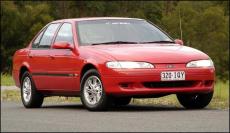Rear wheel drive can be dangerous
 I think this (apparently uniquely Australian) idea that big family cars need to be rear wheel drive is simply rubbish. You hear it all the time – rear wheel drive is best for towing, rear wheel drive is best for handling, rear wheel drive is somehow hugely superior over front wheel drive. Well, apparently it is for the macho Australian male, anyway.
I think this (apparently uniquely Australian) idea that big family cars need to be rear wheel drive is simply rubbish. You hear it all the time – rear wheel drive is best for towing, rear wheel drive is best for handling, rear wheel drive is somehow hugely superior over front wheel drive. Well, apparently it is for the macho Australian male, anyway.
From the day I first bought a car I have never been a believer in the philosophy; in the time since I’ve owned rear wheel drive, four wheel drive and front wheel drive cars – and I have remained unconvinced. In fact, if anything, I think I am leaning heavily in the direction that rear wheel drive, without traction control (or better still, stability control) is potentially bloody dangerous.
Today is a perfect example. I’d bought a big workbench on eBay – and this morning I had to go pick it up. The thing is enormous – much too big to fit on my normal 6 x 4 trailer. So I organised the hire of a car carrying trailer. When the alarm went off at 5.45 am (pick-up was set for 8 am) I awoke, listened for a moment, and then my heart sank.
It was raining.
I needed to go down the narrow, tortuous road from the mountain on which I live, pick up the huge trailer, then drive straight back up the mountain, descending the other side on an even tighter, narrower road. All in Frank the EF Falcon, a car which even without a trailer hooked on the back, power oversteers around these wet and slippery corners even when you’re trying to drive gently. Perhaps it’s the tyres – and the rears are certainly down in tread although still quite legal – or perhaps it’s the sheer torque and throttle response of the 5-speed manual Falc. But either way, it’s a car that in the wet needs to be treated with an incredibly judicious right foot. Even when you’re not towing a huge trailer with a 300kg workbench strapped to it.
I am probably well above the bottom level of driving ability. At minimum, I am highly experienced; I have driven a huge number of different cars; and I have completed advanced driving courses held on racetracks. I certainly don’t think of myself as a great driver (you only need go for a fast ride with a rally champion to realise how pedestrian one’s own skills are!), but I am sure that there are plenty who would have found the trailer-and-rear-wheel-drive-and-wet-tricky-road combination even harder. And I found it hard enough.
And the main reason it was difficult was rear wheel drive. In a front wheel drive car of similar mass and power to the Falcon, cornering wheelspin would not have destabilised the car/trailer combination. It would have been just that: wheelspin, perhaps with a hint of understeer thrown in. Wheelspin that could not (easily) have caused a jack-knife. Simply put, for these conditions, the wrong wheels were doing the driving.
Two other thoughts strike me. The first is the new car review we did on the VT V6 Commodore back in 1999 (see New Car Test – Holden VT Commodore V6 Berlina). It’s a car on the road in huge numbers. I wrote:
Central to the handling outcome is the slipperiness of the road and the weight of your right foot; the instant torque response of the V6 (304Nm at 3600 rpm) coupled with the basic suspension specification and lack of traction control makes this a car where wet roads need to be treated with caution. Even in the wet, the car is fine up to a certain point; beyond that, things get ragged fast. The Berlina does not have an LSD as standard (though it is an option) and this allows the inside wheel to spin away excess torque relatively harmlessly – with an LSD, wet road power oversteer would be ever-present. Relatively slim and tall 205/65 tyres, a slick wet bitumen surface, ham-footed throttle use and something unexpected cropping up – a sharp hump mid-way through a corner, for example – and the VT can assume a missile-like life of its own as the rear attempts to snap past the front. That’s a worse-case handling scenario – but on real roads and with real drivers they do exist!
After the test was published, the Holden PR man mumbled something about the car having worn rear tyres… but they were certainly of legal tread depth.
And the other thought? The initial poor sales performance of the Holden Monaro when it was being sold in the US as the Pontiac GTO was partly blamed on the fact it was being sold in winter – and who wants to drive a powerful RWD car in the snow?!
For all the discussion group posters about to write, I’ll say it all for you.
He’s just a wanker who can’t drive.
I like power oversteer; only a person who couldn’t drive wouldn’t like it.
What a crock! Thanks Christ there are some real motoring journos out there, not like this bloke.
He should stick to driving front-wheel drive shopping trolleys – that’s all he’s good for…
And so on.
But I think that in the real world of slippery wet roads, of cars that tow trailers and caravans, of varying skill levels and tiredness and misjudgement, rear-wheel drive has a lot to be wary of. Without any doubt at all, today I would have been vastly happier towing in a front wheel drive or four wheel drive car.

 Julian Edgar, 50, has been writing about car modification and automotive technology for nearly 25 years. He has owned cars with two, three, four, five, six and eight cylinders; single turbo, twin turbo, supercharged, diesel and hybrid electric drivelines. He lists his transport interests as turbocharging, aerodynamics, suspension design and human-powered vehicles.
Julian Edgar, 50, has been writing about car modification and automotive technology for nearly 25 years. He has owned cars with two, three, four, five, six and eight cylinders; single turbo, twin turbo, supercharged, diesel and hybrid electric drivelines. He lists his transport interests as turbocharging, aerodynamics, suspension design and human-powered vehicles.

on July 25th, 2007 at 12:39 pm
I kept my late EF 11 5 speed Futura on the standard compliant springs but added Pedders Touring Black (again compliant) shocks and new Yokohama tyres and found it less prone to bumping and slipping around the wet hinterland roads than stiffer set ups like Fred. (I tried Gabrial sports gas shocks and thought them skittisk and they ruined the slow speed ride). I replaced the Falcon with a Magna Sports 5 speed auto which was a great car in many ways but which I have now sold after becoming tired of the front drive nose heaviness when cornering; down hill and off – camber bends with undulations emphasised the nose heavy feeling. I have mostly towed with rwd ( Torana 6 and v8 autos and HQ Statesman v8, and even a rotary Mazda) and again emphasise compliant suspension and good dampers combined with the smoothing effect of an auto transmission makes for a good towing setup. We regularly towed a speedboat over the Great Dividing Range and found that a basic level ride (Hayman reece) made a big improvement even on the big, heavy Statesman. Towing with fwd presents problems with slippery uphill starts, most noticable on boat ramps. I reckon a Magna AWD would be a perfect middleweight towcar and great all rounnd sports sedan and am currently shopping one against a BA XR6 or Ghia (for it’s more compliant suspension settings). Your comments elsewhere about Magna’s feeling old before their time parallels my own experience and I attribute this to the compromises inherent in feeding lots of tourque through the front end. However lots of torque makes for relaxed towing (on both the car and the driver) provided you tread lightly on the throtle in wet conditions. Traction control and ABS both seem to be really worth having and should further tame a powerful rwd car.
on April 8th, 2009 at 12:31 pm
In that situation it does make sense that RWD would be potentially more dangerous. I recall the FWD vs. RWD arguments of my youth. The conclusion that we came to was that they traded places depending upon the situation. It looks like not much has changed.